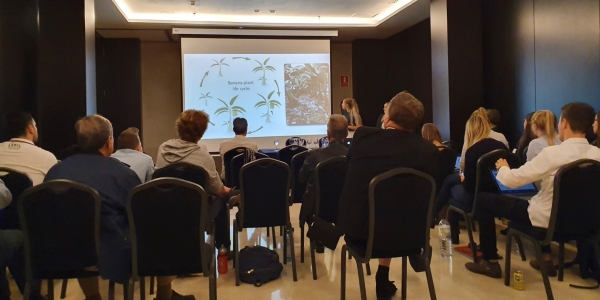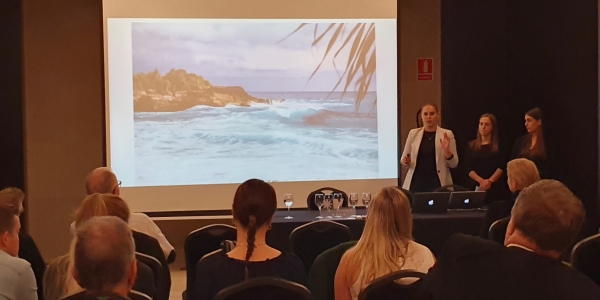For the third time in a row, Humboldt Cosmos Multiversity welcomed to Tenerife a group of Master students from Kempten University of Applied Sciences (Bavaria, Germany). High technology, renewable energies, mobility, and logistics were some of the opportunities outside tourism explored by the group.
Professor Dr. Andreas Müller, who accompanied the group stated: “The Canaries offer an exceptional combination of high tech and infrastructure. Its geographic limitations are an ideal testing ground to develop unique business models for a future beyond tourism”. Professor Dr. Katrin Stefan, head of the Master Program in Global Business Development, was also present during the group’s visit.
Both Humboldt Cosmos Multiversity president, Professor Dr. Günter Koch, and vice president, Professor Dr. Rordrigo Trujillo González (Universidad de La Laguna) were present as well. Máximo Nägele Hernández was the representative from the Colegio de Ingenieros Industriales de Tenerife (COIITF).
“The Canaries offer an exceptional combination of high tech and infrastructure. Its geographic limitations are an ideal testing ground to develop unique business models for a future beyond tourism”
This year, the students’ project consisted of ideate a business in the arena of the circular economy. Such a task does not only include a basic understanding of business modeling. Moreover, it also needs to consider the sustainability and efficiency of resources, as well.
How could such a circular business look like? Some of the examples discussed were models including net-zero ecological footprint, the extension of a product life cycle. Other ideas presented were base on running product-based services, exploitation of a product’s residual value, or facilitation of a sharing platform.
In only one week, the students got in touch with local companies and develop their first ideas in parallel. The students’ agenda also included visits to the island’s main banana companies, such as Coplaca (Santa Cruz de Tenerife), and FAST Company (La Orotava). Besides, the group had the chance to take a deep dive into the Santa Cruz de Tenerife’s Harbour facilities, the Institute of Renewable Energies (ITER) and the PIRS Ecological Complex (Granadilla) as well.
Additional presentations at the University of La Laguna included Tenerife’s Interurban Transport Company (TITSA) data management and internationalization as main topics. Deep insights into electrical vehicles, diverse sources of financial support, and even an explanation of the island’s fauna, as one group, was eager to understand which particular insects could be the basis of their business.
Tourism counts for 80% of the business activity in the Canary Islands. However, the main arguments for foreign investors are often based on weather, nature, and connectivity.
As per reviewed from PROEXCA’s location policies and leaflets, the Canary Islands’ economy is still dominated by tourism. Tourism counts for 80% of the business activity in this area. However, the main arguments for foreign investors are often based on weather, nature, and connectivity.
Ireland has become the US-based companies preferred choice to access the European market. The Canary Islands could play the same role in Latin America or even African companies. Nevertheless, due to its location, the Canary Islands probably could not afford to host a major industrial player. This means that the islands should only focus on SMEs. Yet, a strong local bank could help to tie closer relationships with Latin America, where many migrants from the Canaries went in the past.
The students worked in small groups and developed various ideas. Why not using banana leaves for packaging? 280 million leaves are annually only used for fertilizing the next generation of Canary Island’s bananas. This practice could help only to reduce plastic wrappers. Producers can also use marketing tools to boost the eco-friendly approach of the product.
Another idea consisted of an insect farm to provide proteins. Weather conditions and import regulations are the fundamentals of a quickly growing business, a solid alternative to replace beef, sheep or goat meat. Some of these insects are even capable to biodegrade styrofoam into CO2 and crop soil.
Meanwhile, another group developed an idea to reduce the amount of plastic waste produced by ships. The students suggested a US procedure that fines every ship which exceeds the waste amounts allowed. The shipping company then must assume the charge for recycling.
Green energy is one of the most valuable opportunities the islands offer. By using the waterpower stations of El Hierro and Gran Canaria, as an island energy platform in which the surplus of solar or wind energy can be pumped to a storage lake, and be reused when needed. The model provides hydrogen from the seawater as an alternative storage.
Finally, the last group proposed a mobility service similar to BlaBlaCar. As mobility and vehicle excess are one of the main problems of the island, this app would help drivers and ride consumers match through an online platform.
In a remarkably short amount of time, the students understood Tenerife’s business opportunities and developed draft business models for the island. The final presentation hosted guests from the island as well as from an innovation conference, organized by the University of La Laguna, and Humboldt Cosmos Multiversity.
All parties, Kempten University of Applied Sciences, the professors, University of La Laguna, and all local hosts involved confirmed their interest in such an event to be repeated in 202o. From Humboldt Cosmos Multiversity we are looking forward to doing it as well!




